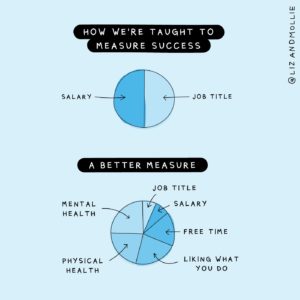To kick off the new year, Professor Laura Chamberlain and I hosted a LinkedIn Live discussion on the topic of how to thrive as a marketer in 2024.
You can watch the discussion here:
At this time of year, we’re always inundated with summary reports and predictions, and as an info junkie I can’t help but read as many as I can. There’s rarely any big surprises, as most trends are evolutionary rather than a big change that happens overnight however it’s always useful to take time to review and reflect on what’s happening in the world around us.
Global Events and Marketing Impacts
2023 witnessed significant global events that continue to shape our marketing. The ongoing conflict in Ukraine and Russia, the developments in Gaza and Palestine, and the persistent cost of living crisis are not isolated situations. They resonate deeply in our professional and personal lives, influencing consumer behaviours and in turn our marketing messages.
Shifts in Work Culture
Another important trend to consider is the changes in work culture. The debate between working from home, hybrid working, and the recent push towards returning to the office reflects a diverse range of sentiments.
We’re also seeing a heightened focus on workplace wellbeing (which is a great thing!) within organisational cultures and this is increasingly being reflected in marketing content. We’re seeing more content around what it’s like to work for an organisation, the behind-the-scenes activities to bring teams together and events that are being hosted to support employees. It’s great to see more transparency, authenticity and honest conversations taking place.
The Impact of Political Events
Looking ahead, we’re anticipating the impact of major political events, such as elections in the UK, the US, and other parts of the world in 2024. Regardless of personal political stances, these events will inevitably impact our organisations, marketing activities, advertising budgets, and the way we interact on social media platforms.
Marketing Budgets on the Rise
The perception and value of the marketing department within an organisation are subjects of ongoing debate and analysis. The latest update from the Institute of Practitioners in Advertising, highlighted in their Bellwether report, sheds light on the current state of marketing budgets in the UK and opens a broader conversation about the role and recognition of marketing in businesses today.
According to the Bellwether report, total UK marketing budgets saw a significant upward revision in Q4 2023, marking the strongest level in nearly a decade. Despite challenging economic conditions, businesses are choosing proactive engagement over retreating into cost-saving modes.
Good news!
The Stress of Proving the Value of Marketing
However, a parallel narrative, emerges from a Marketing Week article that points out a major source of stress for marketers: proving the value of marketing to safeguard their budgets.
This concern is a critical aspect of our role as marketers – not just managing and requesting budget allocations but also vigorously defending and justifying our department’s worth and contributions.
There is a lingering misconception in some circles that views marketing merely as a cost centre, often trivialised as the ‘colouring-in department’. This perspective is not only inaccurate but also diminishes the strategic and revenue-generating capabilities of marketing. It is imperative for us as marketers to demonstrate the impacts that our efforts bring to the organisation. However, this is often easier said than done!
Internal Reporting
The key is often in how we present and communicate our achievements and plans, both within and outside the marketing department. It’s about showcasing how our work aligns with the overall business objectives and contributes to the bottom line. This involves a shift in how we report our activities and results, ensuring that our internal communications are as strategically thought-out as our external campaigns.
We need to think like marketers even when we are reporting internally – considering our audience (in this case, other departments, or the board), tailoring our message to speak their language, and presenting data in a compelling, understandable manner.
2024 Resolutions
Brandwatch has revealed some intriguing insights about the most popular ‘New Year’ resolutions posted online.
According to Brandwatch’s social media listening data, ‘learning something new’ has consistently topped the list of resolutions over the past few years.
Laura and I have talked about learning on previous sessions (you can find our full YouTube playlist, here) and are obviously fully supportive of this finding!
It’s useful to remember that learning can take many forms – from reading and conversing to listening to podcasts.
Four Prompts to Structure Your Learning in 2024
To help structure your learning journey, consider these four prompts:
- I Want to Know: Identify what you’re curious about. Is it something new, something trending or deepening your understanding of a known subject?
- I Want to Be Able to Do: Focus on acquiring a new skill or capability, such as mastering a specific type of data analysis or social media listening.
- I Want to Practice: Enhance your proficiency in a skill you already possess by applying it in various contexts.
- I Want to Be an Expert In: Aim for a deep dive into a subject to become an expert in that area.
By following these prompts, you can set clear, achievable learning objectives for the year. Consider dedicating each quarter to one of these prompts, enabling a structured yet flexible approach to your personal development.
Implementing What You Learn
The key to effective learning is not just in acquiring knowledge but also in applying it. As a Chartered Marketer, I regularly reflect on my learning experiences and consider how to implement this knowledge practically. This approach ensures that my learning directly benefits my work and my clients.
For my own CPD in 2023 I completed Level 2 certificates in Understanding Mental Health First Aid and Mental Health Advocacy in the Workplace, Equality and Diversity, and LGBT Inclusion in the workplace. These areas are not only relevant to my professional development but I’ve also been able to implement my learnings into my consultancy and training work.
Reframing Success
How we define success and approach skill development is crucial. The conventional measures of success, often defined by job titles and salaries, are changing, as illustrated in this brilliant graphic by Liz and Mollie.
Competencies vs. Skills
Laura’s career consultancy ‘Think Talk Thrive’ focuses on professional development and career strategy. She offers personalised coaching, strategy development, skill enhancement, and learning opportunities.
In our discussion, Laura shared the importance of understanding the difference between competencies and skills. Competencies are the ability to perform specific tasks (e.g., writing AI prompts). Competencies are almost like hygiene factors – necessary but not sufficient on their own. Skills are more inherent qualities that are transferable across different contexts (e.g., problem-solving, innovative thinking). What truly adds value and makes you employable and unique are skill sets, or rather, skills stacks, where various abilities interplay and complement each other. Regular self-assessment and adaptation of your skill stack are vital in staying relevant and effective as a marketer.
Let’s sum up the conversation:
- Adapting to Evolving Trends: Marketing is always changing, and staying adaptable to continuous changes is vital. This includes understanding the impact of global events, shifts in work culture, and the political climate on our marketing activities.
- Embracing Honesty and Transparency: When everything feels so saturated in information, authenticity, honesty, and transparency in marketing are more crucial than ever. Building trust with your audience is key to effective communication and engagement.
- Redefining Success: Moving beyond traditional metrics like job titles and salaries, success in marketing is increasingly about personal satisfaction, making a meaningful impact, and finding a balance between work and personal life. Thriving, rather than just succeeding, becomes a more holistic goal.
- Continuous Learning and Skill Development: The importance of ongoing learning and skill enhancement cannot be overstated. Utilising tools like the marketing skills audit and embracing various learning methods can significantly help in personal and professional growth.
- Competencies vs. Skills: Understanding and distinguishing between competencies (knowing how to perform specific tasks) and skills (inherent, transferable qualities) is crucial. Developing a unique skill stack is what sets marketers apart in their field.


